In Focus This Week
CEAL Team
Election Center’s Coalition of Election Association Leaders launches guidebook, webpage
By Tammy Patrick, Chief Program Officer
Election Center
Today, the Coalition of Election Association Leaders (CEAL) published the Association Maturation Guidebook: A Self-Assessment Guide to 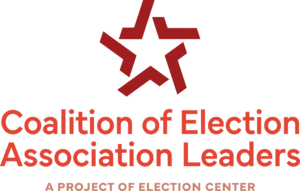 the Evolution of Election Associations, a valuable resource and self-assessment tool designed to help state and local election associations.
the Evolution of Election Associations, a valuable resource and self-assessment tool designed to help state and local election associations.
CEAL provided a preview of the guidebook for attendees at Election Center’s April 2025 Special Workshop in Pittsburgh as the first step in this iterative process.
“I had the privilege of attending the Election Center’s ‘Special Workshop for Coalition of Election Association Leaders’ held in Pittsburgh from April 23 to 25,” said Julian M. Young, Director, Florence County Voter Registration and Elections. “This workshop was packed with

Members of the CEAL team gather in Pittsburgh.
outstanding and relevant information for those of us election officials who are part of our State Associations. The speakers and organization leaders who shared their knowledge and wonderful research regarding their work with state associations were inspiring and spot on. I am thankful to the great Election Staff and Board who work so hard at engaging election officials in such meaningful and useful workshops.”
The Association Maturation Guidebook provides practical strategies and tools to enhance the effectiveness and capacity of state associations in upholding the integrity of the election process. These include a national landscape analysis of state associations, which provides insight into the number of state associations currently in operation and an overview of some of their operational and financial procedures. The analysis informs several self-assessment tools, including a list of questions for determining whether an association is informal, semi-formal, or formal, and an in-depth strategic assessment worksheet to support associations’ strategic planning.
The origins of this project trace back to the vision of Stacey Scholl, a former Senior Program Associate at Democracy Fund, Pam Anderson, President of Consilium Colorado, who had run the Colorado County Clerks Association (CCCA) for many years, and me. Our initial efforts involved compiling a dataset of state association names, websites, and contact information, and cataloging conference information, social media presence, and the focus areas of each association. In 2023, this foundational work was moved to Election Center, leveraging its hub for election officials and state association leaders to gather valuable insights in one centralized location.
“CEAL is bringing association leaders together in an innovative environment to foster collaboration across states during this challenging time in elections administration,” Kathy J. Holstine Campbell, MACCEA Executive Director “As one of five state association executive 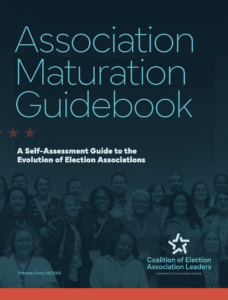 directors, it was a privilege to be among peers who are modeling the way for associations to serve their members in a meaningful manner. Election Center’s dedicated focus on learning is the key to our success.
directors, it was a privilege to be among peers who are modeling the way for associations to serve their members in a meaningful manner. Election Center’s dedicated focus on learning is the key to our success.
CEAL collaborated with partners and organizations across the field to create this guidebook, ensuring the final product is actionable and provides tangible benefits. Association leaders and members can use the guidebook to strengthen state associations that support professional development, collaboration, and advocacy efforts for election officials. Four case studies highlight best practices among state election official associations in Colorado, Missouri, Ohio, and Texas.
This guidebook is the first product of the Coalition of Election Association Leaders (CEAL). CEAL, a project of Election Center, serves as a network for current, past, and aspiring election official leaders. It is a supportive network that helps state election associations grow by providing guidance, networking opportunities, best practices, and data-driven tools. The Association Maturation Guidebook is our latest endeavor to help association leaders and members support their colleagues both within their state and nationwide.
Visit the new CEAL page on Election Center’s website to download the Association Maturation Guidebook and view additional resources for state associations. Election Center members can also access the workshop presentations in the “Member Resources” section of the new member portal.
electionline Daily News Email
 What’s the best part of waking up? electionline Daily News in your inbox of course so be sure to sign up for your daily dose.
What’s the best part of waking up? electionline Daily News in your inbox of course so be sure to sign up for your daily dose.
Each morning you’ll receive the top headlines of the day, plus a listing of states featured in that day’s news round up.
To sign up, simply visit our site and provide us with your email and you’ll begin receiving the news in your inbox each morning.
We Google so you don’t have to!
Election News This Week
 Federal Update: During last week’s Standards Board meeting, members of the U.S. Election Assistance Commission fielded questions from state and local elections officials about how the commission will be involved in the implementation of President Donald Trump’s elections executive order. “I can see on your faces there’s a lot of concern in this room for this process and other aspects of it,” Commissioner Thomas Hicks said. “And I would highly encourage you to send comments to us on that.” An election official from Utah raised concern about how Native American communities might be affected under a proof-of-citizenship requirement, while an election official from Florida asked how voting machine companies could be expected to respond when a voting system has yet to be certified to meet the latest guidelines, which were updated in 2021, according to The Associated Press. Donald Palmer, chair of the Election Assistance Commission, sought to reassure election officials that the commission would weigh their concerns and encouraged them to continue sharing their thoughts. “Wherever we end up in this process, my goal is to provide the least disruption to the states, to mitigate any impact on you and your voting systems,” Palmer told the group. At the same meeting, election officials learned that to apply for election security grants, they would have to sign an agreement certifying that they do not “operate any programs promoting DEI” that violate federal antidiscrimination laws. After facing pushback from state officials, the commission told states Friday it was reviewing the terms and conditions of the grants. “More information will be provided soon,” said an email from the commission that was obtained by The Washington Post. A spokesperson for the commission did not respond to questions about the grants. The White House said it was reasonable to expect states to follow antidiscrimination laws if they receive federal election funds. In more EAC-related news, at a House hearing on California’s ballot counting process this week, Palmer said, “There should be a deadline for absentee or mail ballots prior to Election Day and then they should be returned by Election Day.” In his written testimony to the Committee on House Administration, Palmer specified that the statements were his personal opinion. “Unless otherwise noted, I am solely responsible for this testimony, and my views may not necessarily reflect the positions of the agency or those of my fellow EAC Commissioners,” Palmer said. Over at the Department of Justice, according to numerous news reports, since being sworn in this month, civil rights director Harmeet K. Dhillon has redirected her staff to focus on combating antisemitism, the participation of transgender athletes in women’s sports and what Trump and his allies have described as anti-Christian bias and the Democrats’ “woke ideology.” The division changed mission statements across its sections to focus less on racial discrimination and more on fighting diversity initiatives. And department officials reassigned more than a dozen career staffers — including section chiefs overseeing police brutality, disability and voting rights cases — to areas outside their legal expertise. On the cybersecurity front, this week Department of Homeland Security Secretary Kristi Noem outlined her plans to refocus the Cybersecurity and Infrastructure Security Agency (CISA) on protecting critical infrastructure from increasingly sophisticated threats — particularly from China — while distancing the agency from what she characterized as mission drift under previous leadership. Additionally, according to a report in The Hill, the Department of Government Efficiency (DOGE) has referred dozens of alleged cases of voter fraud to DOJ for prosecution. Antonio Gracias, who is working for DOGE in the Social Security Administration, said the cost-cutting panel had identified 57 resident aliens who had registered to vote. “We’ve referred many prosecutions to the DOJ, and they’re working on them now,” he said. “They take a long time to prepare because you have to go to the states and get information and be 100 percent sure you’re correct. And the problem is it’s very laborious because, as I pointed out, it’s several different databases. You have to actually hand sample the databases trying to find the stuff. You can’t compare them automatically.”
Federal Update: During last week’s Standards Board meeting, members of the U.S. Election Assistance Commission fielded questions from state and local elections officials about how the commission will be involved in the implementation of President Donald Trump’s elections executive order. “I can see on your faces there’s a lot of concern in this room for this process and other aspects of it,” Commissioner Thomas Hicks said. “And I would highly encourage you to send comments to us on that.” An election official from Utah raised concern about how Native American communities might be affected under a proof-of-citizenship requirement, while an election official from Florida asked how voting machine companies could be expected to respond when a voting system has yet to be certified to meet the latest guidelines, which were updated in 2021, according to The Associated Press. Donald Palmer, chair of the Election Assistance Commission, sought to reassure election officials that the commission would weigh their concerns and encouraged them to continue sharing their thoughts. “Wherever we end up in this process, my goal is to provide the least disruption to the states, to mitigate any impact on you and your voting systems,” Palmer told the group. At the same meeting, election officials learned that to apply for election security grants, they would have to sign an agreement certifying that they do not “operate any programs promoting DEI” that violate federal antidiscrimination laws. After facing pushback from state officials, the commission told states Friday it was reviewing the terms and conditions of the grants. “More information will be provided soon,” said an email from the commission that was obtained by The Washington Post. A spokesperson for the commission did not respond to questions about the grants. The White House said it was reasonable to expect states to follow antidiscrimination laws if they receive federal election funds. In more EAC-related news, at a House hearing on California’s ballot counting process this week, Palmer said, “There should be a deadline for absentee or mail ballots prior to Election Day and then they should be returned by Election Day.” In his written testimony to the Committee on House Administration, Palmer specified that the statements were his personal opinion. “Unless otherwise noted, I am solely responsible for this testimony, and my views may not necessarily reflect the positions of the agency or those of my fellow EAC Commissioners,” Palmer said. Over at the Department of Justice, according to numerous news reports, since being sworn in this month, civil rights director Harmeet K. Dhillon has redirected her staff to focus on combating antisemitism, the participation of transgender athletes in women’s sports and what Trump and his allies have described as anti-Christian bias and the Democrats’ “woke ideology.” The division changed mission statements across its sections to focus less on racial discrimination and more on fighting diversity initiatives. And department officials reassigned more than a dozen career staffers — including section chiefs overseeing police brutality, disability and voting rights cases — to areas outside their legal expertise. On the cybersecurity front, this week Department of Homeland Security Secretary Kristi Noem outlined her plans to refocus the Cybersecurity and Infrastructure Security Agency (CISA) on protecting critical infrastructure from increasingly sophisticated threats — particularly from China — while distancing the agency from what she characterized as mission drift under previous leadership. Additionally, according to a report in The Hill, the Department of Government Efficiency (DOGE) has referred dozens of alleged cases of voter fraud to DOJ for prosecution. Antonio Gracias, who is working for DOGE in the Social Security Administration, said the cost-cutting panel had identified 57 resident aliens who had registered to vote. “We’ve referred many prosecutions to the DOJ, and they’re working on them now,” he said. “They take a long time to prepare because you have to go to the states and get information and be 100 percent sure you’re correct. And the problem is it’s very laborious because, as I pointed out, it’s several different databases. You have to actually hand sample the databases trying to find the stuff. You can’t compare them automatically.”
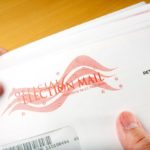 The Case of the Missing Ballots: Not even Jessica Fletcher may be able to solve this one. The Vanderburgh County, Indiana Election Office received 6,428 requests for absentee ballots in last year’s election. Of those, 5,886 were returned. Forty-one were subsequently tossed out because they arrived after the deadline. The 91.5% absentee ballot return rate was a few percentage points lower than past election years’ return rates, a scenario former County Clerk Marsha Abell Barnhart says would have been unlikely in a high turnout presidential election. One of these years, Barnhart imagines, someone in a U.S. postal facility somewhere will stumble upon a dusty old box and find hundreds of absentee ballots mailed by Vanderburgh County voters in 2024. By then, of course, it will be too late to matter. It’s already too late for them to be anything but artifacts. When Barnhart left office as county clerk on Jan. 1, she was conducting an investigation into the fate of nearly 550 mail-in absentee ballots that hadn’t shown up after the election nearly two months earlier. They still haven’t shown up, said Dottie Thomas, who succeeded Barnhart as Vanderburgh County’s chief elections officer in January. And there’s been no word about the missing ballots from the U.S. Postal Service, the clerk said. “I think they’re gone for good,” said Thomas, who was elected on Nov. 5. “I don’t know where, but they’re gone for good.” The former clerk was driven from the beginning of her quest for answers by her conviction that hundreds of voters would not go to the necessary trouble to vote absentee by mail and then fail to follow through. Barnhart has another idea, she told the Evansville Courier & Press that she’s pretty convinced something happened to them since Evansville’s mail is now being sorted through Kentucky. Barnhart regrets how unsettled and unfinished the whole matter seems. She is convinced that hundreds of Vanderburgh County voters were disenfranchised by the Postal Service’s “poor management. “I ran out of time because I had to vacate the office,” she said. “I wish I could have stayed around and taken it on as a project, to be able to keep calling people, because I still feel that taking mail from Evansville, Indiana, to Louisville, Kentucky — there’s something that just shouldn’t happen.”
The Case of the Missing Ballots: Not even Jessica Fletcher may be able to solve this one. The Vanderburgh County, Indiana Election Office received 6,428 requests for absentee ballots in last year’s election. Of those, 5,886 were returned. Forty-one were subsequently tossed out because they arrived after the deadline. The 91.5% absentee ballot return rate was a few percentage points lower than past election years’ return rates, a scenario former County Clerk Marsha Abell Barnhart says would have been unlikely in a high turnout presidential election. One of these years, Barnhart imagines, someone in a U.S. postal facility somewhere will stumble upon a dusty old box and find hundreds of absentee ballots mailed by Vanderburgh County voters in 2024. By then, of course, it will be too late to matter. It’s already too late for them to be anything but artifacts. When Barnhart left office as county clerk on Jan. 1, she was conducting an investigation into the fate of nearly 550 mail-in absentee ballots that hadn’t shown up after the election nearly two months earlier. They still haven’t shown up, said Dottie Thomas, who succeeded Barnhart as Vanderburgh County’s chief elections officer in January. And there’s been no word about the missing ballots from the U.S. Postal Service, the clerk said. “I think they’re gone for good,” said Thomas, who was elected on Nov. 5. “I don’t know where, but they’re gone for good.” The former clerk was driven from the beginning of her quest for answers by her conviction that hundreds of voters would not go to the necessary trouble to vote absentee by mail and then fail to follow through. Barnhart has another idea, she told the Evansville Courier & Press that she’s pretty convinced something happened to them since Evansville’s mail is now being sorted through Kentucky. Barnhart regrets how unsettled and unfinished the whole matter seems. She is convinced that hundreds of Vanderburgh County voters were disenfranchised by the Postal Service’s “poor management. “I ran out of time because I had to vacate the office,” she said. “I wish I could have stayed around and taken it on as a project, to be able to keep calling people, because I still feel that taking mail from Evansville, Indiana, to Louisville, Kentucky — there’s something that just shouldn’t happen.”
 Podcasts: In the latest episode of High Turnout Wide Margins, hosts Eric Fey and Brianna Lennon speak with Tina Guilford. She’s the Town Clerk in Derry, New Hampshire – home to the largest polling place in the United States (One polling location for 21,000 voters). They spoke about a newer law in New Hampshire that requires all people to provide proof of United States citizenship to register to vote, as well as how this new law has impacted the administration of elections in the state. On the most recent episode of The Voting Booth podcast from the American Enterprise Institute, host John Fortier speaks with The Turnout’s Jared Marcocet about developing and testing election equipment.
Podcasts: In the latest episode of High Turnout Wide Margins, hosts Eric Fey and Brianna Lennon speak with Tina Guilford. She’s the Town Clerk in Derry, New Hampshire – home to the largest polling place in the United States (One polling location for 21,000 voters). They spoke about a newer law in New Hampshire that requires all people to provide proof of United States citizenship to register to vote, as well as how this new law has impacted the administration of elections in the state. On the most recent episode of The Voting Booth podcast from the American Enterprise Institute, host John Fortier speaks with The Turnout’s Jared Marcocet about developing and testing election equipment.
 Sticker News: Mesa County, Colorado Elections announced the winners of the second annual “I Voted” Sticker Contest. 96 kids from across the county submitted sticker designs, and four were picked as the winners. “We are thrilled to see the passion and talent of the youth in our community shine light on the importance of civic engagement for the second year in a row,” Mesa County Clerk and Recorder Bobbie Gross said. “We look forward to seeing our community members proudly wear these beautiful ‘I Voted’ stickers in the 2025 election season.” Kate from Messiah Lutheran Church and School, Jessica from Thunder Mountain Elementary, Layla from Redlands Middle School, and Jacob from Independence Charter School are the winners.
Sticker News: Mesa County, Colorado Elections announced the winners of the second annual “I Voted” Sticker Contest. 96 kids from across the county submitted sticker designs, and four were picked as the winners. “We are thrilled to see the passion and talent of the youth in our community shine light on the importance of civic engagement for the second year in a row,” Mesa County Clerk and Recorder Bobbie Gross said. “We look forward to seeing our community members proudly wear these beautiful ‘I Voted’ stickers in the 2025 election season.” Kate from Messiah Lutheran Church and School, Jessica from Thunder Mountain Elementary, Layla from Redlands Middle School, and Jacob from Independence Charter School are the winners.
Personnel News: Denise Glinatsis Bayer has been recommended to serve on the Mahoning County, Ohio board of elections. Arizona Secretary of State Adrian Fontes (D) has announced his re-election campaign.Iowa Secretary of State has recommended Monroe County Auditor Amanda Harlan to be appointed to the EAC Standards Board. Gavin Chapman has been appointed as the new logistics director for the Broward County, Florida supervisor of elections office. Clint Curtis has been appointed Shasta County, California registrar of voters. Joanna Francescut has announced her candidacy for Shasta County, California clerk and registrar of voters. Arkansas Secretary of State Cole Jester has announced his candidacy for land commissioner. State Rep. Ken Rahjes (R-Agra) has announced his candidacy for Kansas secretary of state.
New Research & Resources
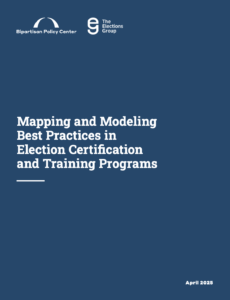 Election Certification and Training Programs: Training programs for election officials prepare them to successfully carry out their duties and reinforce shared norms and values across the field, foster professional connections, and encourage continuous evaluation and improvement. Currently, the training programs’ design and availability are highly inconsistent across states. A new report from the Bipartisan Policy Center and The Elections Group draws on the best practices in election official training programs around the country and the expertise of the Election Workforce Advisory Council to identify and explain the necessary principles and practices of a successful program. It also provides a framework for building a professionalized, cohesive, and well-resourced election workforce across the country. BPC and TEG examine the components of program design and governance—including purpose, participation, management, and administration—as well as course content and instructional design, including laws and regulations, participation engagement, and assessments. Within each component, specific practices are rated according to how critical they are to a successful training program.
Election Certification and Training Programs: Training programs for election officials prepare them to successfully carry out their duties and reinforce shared norms and values across the field, foster professional connections, and encourage continuous evaluation and improvement. Currently, the training programs’ design and availability are highly inconsistent across states. A new report from the Bipartisan Policy Center and The Elections Group draws on the best practices in election official training programs around the country and the expertise of the Election Workforce Advisory Council to identify and explain the necessary principles and practices of a successful program. It also provides a framework for building a professionalized, cohesive, and well-resourced election workforce across the country. BPC and TEG examine the components of program design and governance—including purpose, participation, management, and administration—as well as course content and instructional design, including laws and regulations, participation engagement, and assessments. Within each component, specific practices are rated according to how critical they are to a successful training program.
Ballot Measures, Legislations & Rulemaking
 Fairbanks North Star Borough, Alaska: The Fairbanks North Star Borough Assembly voted last week, 5-4 in favor of an ordinance requiring a hand-counted audit of election results in the borough. The ordinance, brought forward by Assembly member David Guttenberg, changes borough code so that after ballots are processed and tabulated during an election, the canvass board will undergo a hand count of a contested race from two random precincts, as well as one contested race from early voting. This information will serve as an audit of the machine count done on election night, the Assembly said. “Hopefully, we’ll get more confidence in what we’re doing,” Guttenberg said, explaining the intent behind his ordinance, “and I think that’s just a natural outcome of what should be happening to verify what an election is.“
Fairbanks North Star Borough, Alaska: The Fairbanks North Star Borough Assembly voted last week, 5-4 in favor of an ordinance requiring a hand-counted audit of election results in the borough. The ordinance, brought forward by Assembly member David Guttenberg, changes borough code so that after ballots are processed and tabulated during an election, the canvass board will undergo a hand count of a contested race from two random precincts, as well as one contested race from early voting. This information will serve as an audit of the machine count done on election night, the Assembly said. “Hopefully, we’ll get more confidence in what we’re doing,” Guttenberg said, explaining the intent behind his ordinance, “and I think that’s just a natural outcome of what should be happening to verify what an election is.“
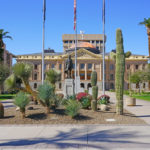 Arizona: Republican lawmakers passed legislation that would cost Arizona counties tens of millions of dollars every election year and would force them to attempt to find 4,000 new voting locations, something that county election officials described as impossible. House Bill 2017 passed through the Senate by a 17-12 party line vote on April 29. Sponsored by Rep. Rachel Keshel, a Tucson Republican and member of the far-right Arizona Freedom Caucus, the proposal would ban in-person early voting and the use of vote centers where any registered voter within a county can cast a ballot. Instead, it would require the use of precincts capped at 1,000 registered voters apiece. Most counties use voting centers, which allow any registered voter to show up and cast a ballot at any polling site in the county. Under the precinct model, only voters assigned to a precinct can vote there, and if they vote at the wrong location, their ballot won’t be counted. According to the Arizona Mirror, the proposal is all but guaranteed to get a veto from Democratic Gov. Katie Hobbs, but the Senate could still vote on its mirror, House Concurrent Resolution 2002, which would bypass the governor’s desk and head straight to the 2026 ballot to be decided by the voters. The Joint Legislative Budget Committee wrote in an April 11 fiscal note that HCR2002 would cost the counties a total of around $53 million in its first election year and more than $21 million each election year after that. House Bill 2017 would have the same impacts, including the requirement that counties open 3,957 additional voting locations for each election, and find more than 27,000 additional poll workers to staff them.
Arizona: Republican lawmakers passed legislation that would cost Arizona counties tens of millions of dollars every election year and would force them to attempt to find 4,000 new voting locations, something that county election officials described as impossible. House Bill 2017 passed through the Senate by a 17-12 party line vote on April 29. Sponsored by Rep. Rachel Keshel, a Tucson Republican and member of the far-right Arizona Freedom Caucus, the proposal would ban in-person early voting and the use of vote centers where any registered voter within a county can cast a ballot. Instead, it would require the use of precincts capped at 1,000 registered voters apiece. Most counties use voting centers, which allow any registered voter to show up and cast a ballot at any polling site in the county. Under the precinct model, only voters assigned to a precinct can vote there, and if they vote at the wrong location, their ballot won’t be counted. According to the Arizona Mirror, the proposal is all but guaranteed to get a veto from Democratic Gov. Katie Hobbs, but the Senate could still vote on its mirror, House Concurrent Resolution 2002, which would bypass the governor’s desk and head straight to the 2026 ballot to be decided by the voters. The Joint Legislative Budget Committee wrote in an April 11 fiscal note that HCR2002 would cost the counties a total of around $53 million in its first election year and more than $21 million each election year after that. House Bill 2017 would have the same impacts, including the requirement that counties open 3,957 additional voting locations for each election, and find more than 27,000 additional poll workers to staff them.
Both the House and Senate have approved a bill that would require counties to purchase voting equipment made solely in the United States, something that does not currently exist. Under the legislation, beginning in 2029, the secretary of state’s office cannot certify vote-recording and vote-tabulating equipment unless each and every part of the machine, including all components and software, are “sourced from the United States.” House Bill 2651 also says the equipment must be assembled in the United States. The measure now goes to Gov. Katie Hobbs.
 Colorado: Legislation that would change how potential ballot measures can be submitted for a Colorado election ballot is just a few steps away from heading to the governor’s desk. House Bill 1327, as written, would change how petitions are submitted to the state’s title board. Legislatures hope this will prevent what happened in 2024 with the ranked-choice voting ballot measure, when multiple versions were created for state officials to review. The law would set reporting requirements as signatures are being gathered and require ballot measures to be labeled. HB 1327 was not amended in the Senate State, Veterans and Military Affairs Committee last week. However, Republicans tried to remove the bill’s safety clause, which they called unnecessary, and replace it with a petition clause that would give citizens the right to challenge the measure. That failed. The bill passed on a party-line vote and is now awaiting debate in the full Senate. Kipp told Colorado Politics she’s considering amendments. The bill also adds fines of $1,500 for anyone who doesn’t follow the changes. Menten said that the right to petition is not universal, and that “we should be celebrating this right, not restricting it.”
Colorado: Legislation that would change how potential ballot measures can be submitted for a Colorado election ballot is just a few steps away from heading to the governor’s desk. House Bill 1327, as written, would change how petitions are submitted to the state’s title board. Legislatures hope this will prevent what happened in 2024 with the ranked-choice voting ballot measure, when multiple versions were created for state officials to review. The law would set reporting requirements as signatures are being gathered and require ballot measures to be labeled. HB 1327 was not amended in the Senate State, Veterans and Military Affairs Committee last week. However, Republicans tried to remove the bill’s safety clause, which they called unnecessary, and replace it with a petition clause that would give citizens the right to challenge the measure. That failed. The bill passed on a party-line vote and is now awaiting debate in the full Senate. Kipp told Colorado Politics she’s considering amendments. The bill also adds fines of $1,500 for anyone who doesn’t follow the changes. Menten said that the right to petition is not universal, and that “we should be celebrating this right, not restricting it.”
Lawmakers are sending the governor a measure meant to shore up voting rights. The move is part of a national effort to write protections established by the federal Voting Rights Act into state laws. But it comes despite opposition from local officials, who have argued the law could upend decades-old practices. Senate Bill 25-001 passed the legislature this week largely along party lines. It would give voters the right to bring discrimination suits at the state level and extend new protections specific to Colorado, including making sure people can vote while in jail and barring discrimination based on gender identity or sexual orientation. Pushback has come from local officials, including some representing progressive parts of the state. They say the measure could reopen settled legal questions about voting practices that some could argue are discriminatory. Those include electing officials at large, which can keep minority candidates out of office, and holding local elections in the spring or summer, when turnout tends to be lower. Throughout the legislative session, the Colorado Municipal League, which represents local governments, has been urging lawmakers to amend the measure. The group says the proposal conflicts with provisions of the Colorado Constitution that bar state regulation of municipal elections. It also says the bill could erode the nonpartisan nature of local elections, by forcing them to coincide with state and federal voting, and it notes that the measure doesn’t apply to state or school board elections.
 Florida: The Senate is preparing to vote on a bill that would add hurdles for citizen-led constitutional amendment initiatives. Democrats fear the new requirements would kill the initiatives before they ever make it to the ballot while Republicans insist the bill cleans up a broken petition-collecting system. Senators read HB 1205 a second time with the Chamber preparing for third reading scheduled for May 1. The House approved the bill earlier this month with a 76-31 vote. Under HB 1205, amendment sponsors would be required to post a $1 million bond among other sweeping changes that also include shortened timelines for petition gathering and stiffer penalties for violations. The Republican-sponsored bill also prohibits using public money to campaign for or against an amendment after Gov. Ron DeSantis spent millions of dollars fighting last year’s marijuana and abortion rights initiatives, both of which ultimately failed.
Florida: The Senate is preparing to vote on a bill that would add hurdles for citizen-led constitutional amendment initiatives. Democrats fear the new requirements would kill the initiatives before they ever make it to the ballot while Republicans insist the bill cleans up a broken petition-collecting system. Senators read HB 1205 a second time with the Chamber preparing for third reading scheduled for May 1. The House approved the bill earlier this month with a 76-31 vote. Under HB 1205, amendment sponsors would be required to post a $1 million bond among other sweeping changes that also include shortened timelines for petition gathering and stiffer penalties for violations. The Republican-sponsored bill also prohibits using public money to campaign for or against an amendment after Gov. Ron DeSantis spent millions of dollars fighting last year’s marijuana and abortion rights initiatives, both of which ultimately failed.
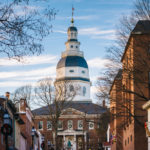 Maryland: Montgomery County Del. Linda Foley (D-Dist. 15) says she’s frustrated after her bill calling for special elections to fill legislative seats again failed to pass during the 2025 Maryland General Assembly session, despite overwhelming support in the Senate. A bill sponsored by Foley and cross-filed by state Sen. Cheryl Kagan (D-Dist. 17), would have required special elections to fill legislative vacancies in certain circumstances. The legislation proposed an amendment to the state constitution to deal with the issue of filling legislative vacancies statewide. Similar bills have been unsuccessful over the past several years. Versions of the legislation like the bills sponsored by Foley and Kagan have failed four times in five years. Similarly to this year, the legislation has often been held up in the House – not necessarily failing to garner votes, but not even appearing on an agenda. In the past, some members of House of Delegates have expressed that the appointment process offers a decreased cost and low barrier to entry to becoming a representative, which could potentially offer opportunities for more marginalized community members. “The fact that this didn’t pass … I mean, it’s beyond ridiculous and without a good reason,” Foley told Bethesda Today in an interview last week.
Maryland: Montgomery County Del. Linda Foley (D-Dist. 15) says she’s frustrated after her bill calling for special elections to fill legislative seats again failed to pass during the 2025 Maryland General Assembly session, despite overwhelming support in the Senate. A bill sponsored by Foley and cross-filed by state Sen. Cheryl Kagan (D-Dist. 17), would have required special elections to fill legislative vacancies in certain circumstances. The legislation proposed an amendment to the state constitution to deal with the issue of filling legislative vacancies statewide. Similar bills have been unsuccessful over the past several years. Versions of the legislation like the bills sponsored by Foley and Kagan have failed four times in five years. Similarly to this year, the legislation has often been held up in the House – not necessarily failing to garner votes, but not even appearing on an agenda. In the past, some members of House of Delegates have expressed that the appointment process offers a decreased cost and low barrier to entry to becoming a representative, which could potentially offer opportunities for more marginalized community members. “The fact that this didn’t pass … I mean, it’s beyond ridiculous and without a good reason,” Foley told Bethesda Today in an interview last week.
 Texas: Bills moving through the Legislature would bar counties from sending out voter registration forms to people who didn’t request them. It would also bar the state from using public money to support such mailings by other groups. State Sen. Paul Bettencourt, a Houston Republican who sponsored Senate Bill 511, said it would put voter-registration applications under the same restrictions that are already in place for mail-ballot applications. A 2021 Texas law — which faces challenges in federal court — barred election officials from sending out unsolicited mail-ballot applications. State Rep. Tom Oliverson, a Houston-area Republican, filed a bill identical to SB 511 in the House. Both bills have been advanced and could soon reach the floors of their respective chambers. Voting rights groups said the bills could also make it harder to get registration forms in other ways. Bettencourt said the bill does not prevent deputy volunteer voter registrars and candidates from distributing voter registration applications. But some voting rights advocates say language in the bill that says state officials “may not distribute a form on which a person may apply for registration to a person who didn’t request it” is too broad. They say it could have implications for election officials who, for instance, choose to display voter registration application forms on the counter of their elections offices.
Texas: Bills moving through the Legislature would bar counties from sending out voter registration forms to people who didn’t request them. It would also bar the state from using public money to support such mailings by other groups. State Sen. Paul Bettencourt, a Houston Republican who sponsored Senate Bill 511, said it would put voter-registration applications under the same restrictions that are already in place for mail-ballot applications. A 2021 Texas law — which faces challenges in federal court — barred election officials from sending out unsolicited mail-ballot applications. State Rep. Tom Oliverson, a Houston-area Republican, filed a bill identical to SB 511 in the House. Both bills have been advanced and could soon reach the floors of their respective chambers. Voting rights groups said the bills could also make it harder to get registration forms in other ways. Bettencourt said the bill does not prevent deputy volunteer voter registrars and candidates from distributing voter registration applications. But some voting rights advocates say language in the bill that says state officials “may not distribute a form on which a person may apply for registration to a person who didn’t request it” is too broad. They say it could have implications for election officials who, for instance, choose to display voter registration application forms on the counter of their elections offices.
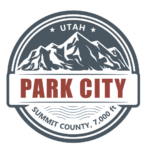 Park City, Utah: This week, Park City Council voted to rescind plans to hold the City Hall election this year through ranked-choice voting. City Councilors Ed Parigian, Jeremy Rubell and Bill Ciraco voted in the majority, while Tana Toly and Ryan Dickey dissented. The vote overturned an earlier decision to employ ranked-choice voting in the mayoral and City Council election in November. The election will be managed in the traditional method, which creates the possibility of a primary election if enough candidates seek the mayor’s office or a seat on the City Council. The vote followed testimony from supporters and critics of the voting method.
Park City, Utah: This week, Park City Council voted to rescind plans to hold the City Hall election this year through ranked-choice voting. City Councilors Ed Parigian, Jeremy Rubell and Bill Ciraco voted in the majority, while Tana Toly and Ryan Dickey dissented. The vote overturned an earlier decision to employ ranked-choice voting in the mayoral and City Council election in November. The election will be managed in the traditional method, which creates the possibility of a primary election if enough candidates seek the mayor’s office or a seat on the City Council. The vote followed testimony from supporters and critics of the voting method.
 Wisconsin: The Legislature’s Joint Committee for the Review of Administrative Rules (JCRAR) deadlocked this week on whether to object to a proposed administrative rule that would guide the conduct of election observers at polling places. The 5-5 vote moves the rule one step closer to going into effect because if the committee doesn’t take any action, it will be returned to the Wisconsin Elections Commission (WEC) to be implemented. Even though the rule was written by WEC with input from an advisory committee that included members of right-wing election conspiracy groups, election skeptics opposed the rule’s passage at a number of public hearings. At a hearing this week, 2020 election deniers — including former state Rep. Janel Brandtjen — testified in opposition to the rule because they believed it didn’t do enough to protect the rights of election observers. Lawmakers on the committee, including its co-chair, Rep. Adam Neylon (R-Pewaukee), complained that the rule was written without enough input from legislators. Despite that opposition, Rep. Kevin Petersen (R-Waupaca) joined with the committee’s four Democrats, Sens. Melissa Ratcliff (D-Cottage Grove) and Kelda Roys (D-Madison) and Reps. Margaret Arney (D-Wauwatosa) and Lee Snodgrass (D-Appleton) to vote against the motion objecting to the rule’s passage.
Wisconsin: The Legislature’s Joint Committee for the Review of Administrative Rules (JCRAR) deadlocked this week on whether to object to a proposed administrative rule that would guide the conduct of election observers at polling places. The 5-5 vote moves the rule one step closer to going into effect because if the committee doesn’t take any action, it will be returned to the Wisconsin Elections Commission (WEC) to be implemented. Even though the rule was written by WEC with input from an advisory committee that included members of right-wing election conspiracy groups, election skeptics opposed the rule’s passage at a number of public hearings. At a hearing this week, 2020 election deniers — including former state Rep. Janel Brandtjen — testified in opposition to the rule because they believed it didn’t do enough to protect the rights of election observers. Lawmakers on the committee, including its co-chair, Rep. Adam Neylon (R-Pewaukee), complained that the rule was written without enough input from legislators. Despite that opposition, Rep. Kevin Petersen (R-Waupaca) joined with the committee’s four Democrats, Sens. Melissa Ratcliff (D-Cottage Grove) and Kelda Roys (D-Madison) and Reps. Margaret Arney (D-Wauwatosa) and Lee Snodgrass (D-Appleton) to vote against the motion objecting to the rule’s passage.
Legal Updates
 Federal Litigation: U.S. District Judge Colleen Kollar-Kotelly blocked the Trump administration from immediately enacting certain changes to how federal elections are run, including adding a proof-of-citizenship requirement to the federal voter registration form. But she allowed other parts of Trump’s sweeping executive order on U.S. elections to go forward for now, including a directive to tighten mail ballot deadlines around the country. The March executive order overhauling how U.S. elections are run prompted swift lawsuits from the League of United Latin American Citizens, the League of Women Voters Education Fund, the Democratic National Committee and others, who called it unconstitutional. Kollar-Kotelly sided with voting rights groups and Democrats, saying that the Constitution gives the power to regulate federal elections to states and Congress — not the president. She noted federal lawmakers are currently working on their own legislation to require proof of citizenship to vote. In a 120-page decision, she said the plaintiffs had proven that the proof-of-citizenship requirement would cause their clients irreparable harm and go against the public interest, while the government had offered “almost no defense of the President’s order on the merits.” Accordingly, she granted a preliminary injunction to stop the citizenship requirement from moving forward while the lawsuit plays out. The judge also blocked part of the Republican president’s order requiring public assistance enrollees to have their citizenship assessed before getting access to the federal voter registration form. But she denied other requests from a group of Democratic plaintiffs, including refusing to block Trump’s order to require all mailed ballots to be received by Election Day nationwide. She also did not touch Trump’s order to open certain databases to billionaire Elon Musk’s Department of Government Efficiency to allow it to review state voter lists to search for noncitizens. The judge said those arguments brought by Democrats were either premature or should be brought by states instead.
Federal Litigation: U.S. District Judge Colleen Kollar-Kotelly blocked the Trump administration from immediately enacting certain changes to how federal elections are run, including adding a proof-of-citizenship requirement to the federal voter registration form. But she allowed other parts of Trump’s sweeping executive order on U.S. elections to go forward for now, including a directive to tighten mail ballot deadlines around the country. The March executive order overhauling how U.S. elections are run prompted swift lawsuits from the League of United Latin American Citizens, the League of Women Voters Education Fund, the Democratic National Committee and others, who called it unconstitutional. Kollar-Kotelly sided with voting rights groups and Democrats, saying that the Constitution gives the power to regulate federal elections to states and Congress — not the president. She noted federal lawmakers are currently working on their own legislation to require proof of citizenship to vote. In a 120-page decision, she said the plaintiffs had proven that the proof-of-citizenship requirement would cause their clients irreparable harm and go against the public interest, while the government had offered “almost no defense of the President’s order on the merits.” Accordingly, she granted a preliminary injunction to stop the citizenship requirement from moving forward while the lawsuit plays out. The judge also blocked part of the Republican president’s order requiring public assistance enrollees to have their citizenship assessed before getting access to the federal voter registration form. But she denied other requests from a group of Democratic plaintiffs, including refusing to block Trump’s order to require all mailed ballots to be received by Election Day nationwide. She also did not touch Trump’s order to open certain databases to billionaire Elon Musk’s Department of Government Efficiency to allow it to review state voter lists to search for noncitizens. The judge said those arguments brought by Democrats were either premature or should be brought by states instead.
 Idaho: The Arizona Legislature joined Montana to lead 18 other states in filing an amicus brief supporting Idaho laws that prohibit the use of high school and college IDs for in-person voting and voter registration. Filed in the U.S. Court of Appeals for the Ninth Circuit, the brief backs Idaho Secretary of State Phil McGrane, the defendant in a lawsuit filed by March for Our Lives Idaho, a student organization that encourages young voters to cast ballots and supports gun safety, and the Idaho Alliance for Retired Americans. Both nonprofits are based in Boise. Their suit contends that prohibiting student IDs discriminates against younger voters and violates the 26th Amendment, which lowered the voting age to 18 when it was passed in 1971. Their suit also notes that Idaho allows others IDs for voters: a state-issued driver’s license or an ID issued by the Idaho Transportation Department, a passport issued by the U.S. government, a tribal ID card or a license to carry a concealed weapon. The U.S. District Court for the District of Idaho granted a summary judgment in Idaho’s favor, but the plaintiffs filed an appeal at the San Francisco-based Ninth Circuit. Arizona and the other states in the “friend of the court” brief are arguing the district court ruled properly in allowing Idaho to exclude student IDs for in-person voting or registration. The states contend there is no evidence that the Idaho Legislature tried to deprive young people of their right to vote by excluding student IDs or that the state violated the 26th Amendment.
Idaho: The Arizona Legislature joined Montana to lead 18 other states in filing an amicus brief supporting Idaho laws that prohibit the use of high school and college IDs for in-person voting and voter registration. Filed in the U.S. Court of Appeals for the Ninth Circuit, the brief backs Idaho Secretary of State Phil McGrane, the defendant in a lawsuit filed by March for Our Lives Idaho, a student organization that encourages young voters to cast ballots and supports gun safety, and the Idaho Alliance for Retired Americans. Both nonprofits are based in Boise. Their suit contends that prohibiting student IDs discriminates against younger voters and violates the 26th Amendment, which lowered the voting age to 18 when it was passed in 1971. Their suit also notes that Idaho allows others IDs for voters: a state-issued driver’s license or an ID issued by the Idaho Transportation Department, a passport issued by the U.S. government, a tribal ID card or a license to carry a concealed weapon. The U.S. District Court for the District of Idaho granted a summary judgment in Idaho’s favor, but the plaintiffs filed an appeal at the San Francisco-based Ninth Circuit. Arizona and the other states in the “friend of the court” brief are arguing the district court ruled properly in allowing Idaho to exclude student IDs for in-person voting or registration. The states contend there is no evidence that the Idaho Legislature tried to deprive young people of their right to vote by excluding student IDs or that the state violated the 26th Amendment.
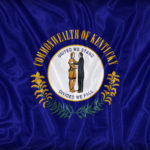 Kentucky: Former Kentucky Secretary of State Alison Lundergan Grimes is free of any state ethics violation charges following years of legal wrangling. The Executive Branch Ethics Commission, which brought charges against her in 2021, has decided not to try to appeal to the Kentucky Supreme Court last month’s unanimous decision by the Kentucky Court of Appeals to uphold a lower court order that cleared Grimes of any wrongdoing. With no appeal to the state’s highest court from the commission within 30 days, the appellate court finalized its decision on April 21. “There are no legal charges any more against her, and there never should have been any,” her attorney, Jon Salomon of Louisville, said this week. Susan Clary, executive director of the ethics commission, had no comment when asked why the commission did not ask the Kentucky Supreme Court to review the Court of Appeals’ decision. The commission had been investigating Grimes for several years. In November 2021, the commission fined Grimes $10,000 for two ethical violations pertaining to handling of voter data.
Kentucky: Former Kentucky Secretary of State Alison Lundergan Grimes is free of any state ethics violation charges following years of legal wrangling. The Executive Branch Ethics Commission, which brought charges against her in 2021, has decided not to try to appeal to the Kentucky Supreme Court last month’s unanimous decision by the Kentucky Court of Appeals to uphold a lower court order that cleared Grimes of any wrongdoing. With no appeal to the state’s highest court from the commission within 30 days, the appellate court finalized its decision on April 21. “There are no legal charges any more against her, and there never should have been any,” her attorney, Jon Salomon of Louisville, said this week. Susan Clary, executive director of the ethics commission, had no comment when asked why the commission did not ask the Kentucky Supreme Court to review the Court of Appeals’ decision. The commission had been investigating Grimes for several years. In November 2021, the commission fined Grimes $10,000 for two ethical violations pertaining to handling of voter data.
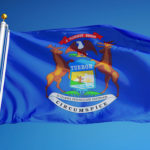 Michigan: Haoxiang Gao, 20, a Chinese national and University of Michigan student accused of illegally voting in the 2024 election is facing a bench warrant after failing to appear in court for a hearing last week. Gao is facing two felony charges that he cast a ballot despite not being eligible and lied on the voter registration form. He was scheduled for a probable-cause hearing but didn’t appear. The hearing had been delayed repeatedly over the past several months. According to Votebeat, it’s not clear where Gao is. K. Orlando Simón, Gao’s attorney and a staff member at the University of Michigan’s Student Legal Services, declined to comment, and university officials did not immediately respond to a request for comment. A voicemail left with the Washtenaw County prosecutor’s office was not immediately returned. If convicted, Gao could face up to nine years in prison and potential deportation.
Michigan: Haoxiang Gao, 20, a Chinese national and University of Michigan student accused of illegally voting in the 2024 election is facing a bench warrant after failing to appear in court for a hearing last week. Gao is facing two felony charges that he cast a ballot despite not being eligible and lied on the voter registration form. He was scheduled for a probable-cause hearing but didn’t appear. The hearing had been delayed repeatedly over the past several months. According to Votebeat, it’s not clear where Gao is. K. Orlando Simón, Gao’s attorney and a staff member at the University of Michigan’s Student Legal Services, declined to comment, and university officials did not immediately respond to a request for comment. A voicemail left with the Washtenaw County prosecutor’s office was not immediately returned. If convicted, Gao could face up to nine years in prison and potential deportation.
 Mississippi: Mississippi officials are appealing to the U.S. Supreme Court a federal court ruling that struck down Mississippi’s five-day grace period for mail-in absentee ballots to arrive after Election Day. Attorneys for the state filed court documents stating their intention to petition the nation’s highest court to overturn a decision from an appellate court that found a state election law conflicted with federal election laws. U.S. District Judge Louis Guirrola halted all lower court action until the proceedings with the Supreme Court are completed. The Republican National Committee, the state Republican Party and the Libertarian Party of Mississippi sued Secretary of State Michael Watson and local elections officials over a state law that allows election workers to process absentee ballots postmarked by Election Day for up to five days after the election. The political parties argue that Congress is the only entity that can set specific parameters for federal elections, while state officials contend that federal law defers to states on specific details for conducting elections. Now Mississippi officials are asking the Supreme Court to uphold the state law, a decision that could have broad implications for more than a dozen states that have similar laws on the books. The litigation does not impact state or local races, including Mississippi’s current municipal elections. Mississippi’s next federal election will be the 2026 midterm.
Mississippi: Mississippi officials are appealing to the U.S. Supreme Court a federal court ruling that struck down Mississippi’s five-day grace period for mail-in absentee ballots to arrive after Election Day. Attorneys for the state filed court documents stating their intention to petition the nation’s highest court to overturn a decision from an appellate court that found a state election law conflicted with federal election laws. U.S. District Judge Louis Guirrola halted all lower court action until the proceedings with the Supreme Court are completed. The Republican National Committee, the state Republican Party and the Libertarian Party of Mississippi sued Secretary of State Michael Watson and local elections officials over a state law that allows election workers to process absentee ballots postmarked by Election Day for up to five days after the election. The political parties argue that Congress is the only entity that can set specific parameters for federal elections, while state officials contend that federal law defers to states on specific details for conducting elections. Now Mississippi officials are asking the Supreme Court to uphold the state law, a decision that could have broad implications for more than a dozen states that have similar laws on the books. The litigation does not impact state or local races, including Mississippi’s current municipal elections. Mississippi’s next federal election will be the 2026 midterm.
 New Jersey: More criminal charges have been filed against Paterson City Council President Alex Mendez in connection with an alleged voter fraud scheme dating the May 2020 election. Mendez and his wife face new charges in the 20-count superseding indictment including attempts to tamper with a witness to the alleged ballot stuffing scheme. Mendez has served on the council for nearly five years – including being re-elected in 2024 – since he was accused of stealing mail-in ballots with numerous co-conspirators in the run-up to the 2020 election. The New Jersey State Attorney General’s office alleged Mendez and several co-conspirators stole mail-in ballots, falsified them, and then stuffed hundreds of them in a mailbox in Haledon to try to win the election. Mendez and his wife Yohanny Munoz-Mendez have denied wrongdoing and previously pleaded not guilty. In all, five people have been charged in the alleged voter fraud scheme. The charges include election fraud, tampering with public records, forgery and the new charge of witness tampering. If convicted, the top count carries a sentence of up to 5-10 years in prison.
New Jersey: More criminal charges have been filed against Paterson City Council President Alex Mendez in connection with an alleged voter fraud scheme dating the May 2020 election. Mendez and his wife face new charges in the 20-count superseding indictment including attempts to tamper with a witness to the alleged ballot stuffing scheme. Mendez has served on the council for nearly five years – including being re-elected in 2024 – since he was accused of stealing mail-in ballots with numerous co-conspirators in the run-up to the 2020 election. The New Jersey State Attorney General’s office alleged Mendez and several co-conspirators stole mail-in ballots, falsified them, and then stuffed hundreds of them in a mailbox in Haledon to try to win the election. Mendez and his wife Yohanny Munoz-Mendez have denied wrongdoing and previously pleaded not guilty. In all, five people have been charged in the alleged voter fraud scheme. The charges include election fraud, tampering with public records, forgery and the new charge of witness tampering. If convicted, the top count carries a sentence of up to 5-10 years in prison.
 New York: Christopher Lindenberg, 54, of Lindenhurst has been arrested for voter fraud after voting in the same election twice, according to Suffolk County District Attorney Raymond Tierney. Lindenberg was arrested after allegedly requesting, completing, and submitting an early mail ballot in another person’s name to the Suffolk County Board of Elections in the 2024 general election, the DA said. The DA said Lindenberg would also go on to allegedly cast a vote himself, thereby voting twice. “Confidence in electoral systems is integral to a free society,” Tierney said. “I thank the Suffolk County Board of Elections for referring this matter to us. My office is committed to ensuring the reliability of our voting process.” According to the investigation, on Oct. 19, 2024, Lindenberg used the early mail ballot online application portal to request a ballot on behalf of another person, unbeknownst to the other individual, the DA said. On April 28, he was arraigned before District Court Judge Jonathan R. Bloom for one count of first-degree offering a false instrument for filing, a Class E felony, and one count of first-degree falsifying business records, a Class E felony, the DA said. Bloom released Lindenberg on his own recognizance during the pendency of the case without bail because his charges are considered non-bail eligible under current New York State law, meaning prosecutors cannot ask for, and judges cannot set, bail, the DA said. Lindenberg is due back in court on May 21 and is being represented by Scott Gross, the DA said.
New York: Christopher Lindenberg, 54, of Lindenhurst has been arrested for voter fraud after voting in the same election twice, according to Suffolk County District Attorney Raymond Tierney. Lindenberg was arrested after allegedly requesting, completing, and submitting an early mail ballot in another person’s name to the Suffolk County Board of Elections in the 2024 general election, the DA said. The DA said Lindenberg would also go on to allegedly cast a vote himself, thereby voting twice. “Confidence in electoral systems is integral to a free society,” Tierney said. “I thank the Suffolk County Board of Elections for referring this matter to us. My office is committed to ensuring the reliability of our voting process.” According to the investigation, on Oct. 19, 2024, Lindenberg used the early mail ballot online application portal to request a ballot on behalf of another person, unbeknownst to the other individual, the DA said. On April 28, he was arraigned before District Court Judge Jonathan R. Bloom for one count of first-degree offering a false instrument for filing, a Class E felony, and one count of first-degree falsifying business records, a Class E felony, the DA said. Bloom released Lindenberg on his own recognizance during the pendency of the case without bail because his charges are considered non-bail eligible under current New York State law, meaning prosecutors cannot ask for, and judges cannot set, bail, the DA said. Lindenberg is due back in court on May 21 and is being represented by Scott Gross, the DA said.
 North Carolina: A panel of North Carolina Court of Appeals judges held that a law granting the Republican state auditor appointment ability over the state board of elections can proceed for now. The decision is in contrast to a ruling last week in a Raleigh court, which found that the General Assembly’s decision to strip that ability from Governor Josh Stein and give it to Auditor Dave Boliek was facially unconstitutional and violated the separation of powers between the branches. “Because the duty to faithfully execute the laws has been exclusively assigned to the governor, Senate Bill 382 cannot reassign that duty to the auditor without violating the Constitution,” the panel of Raleigh judges said. Republican defendants promptly appealed the decision to the state Court of Appeals to “preserve the status quo.” The panel of appeals judges stayed the trial court’s judgment, allowing the auditor to gain control over appointments until an appeal is resolved or the court issues another decision. They did not explain the rationale for their intervention, and the names of the judges on the panel will continue to be sealed for 90 days, although the decision was unanimous. Should the state’s highest court not intervene, the law will go into effect May 1, and Boliek will have the ability to make appointments to elections boards on both the county and state level, chosen from lists of candidates provided by the state Democratic and Republican parties. This ability may potentially shift the boards to a Republican majority, from a 3-2 Democratic majority. Stein, who has appealed the decision to the state Supreme Court, blasted the intermediate court’s decision
North Carolina: A panel of North Carolina Court of Appeals judges held that a law granting the Republican state auditor appointment ability over the state board of elections can proceed for now. The decision is in contrast to a ruling last week in a Raleigh court, which found that the General Assembly’s decision to strip that ability from Governor Josh Stein and give it to Auditor Dave Boliek was facially unconstitutional and violated the separation of powers between the branches. “Because the duty to faithfully execute the laws has been exclusively assigned to the governor, Senate Bill 382 cannot reassign that duty to the auditor without violating the Constitution,” the panel of Raleigh judges said. Republican defendants promptly appealed the decision to the state Court of Appeals to “preserve the status quo.” The panel of appeals judges stayed the trial court’s judgment, allowing the auditor to gain control over appointments until an appeal is resolved or the court issues another decision. They did not explain the rationale for their intervention, and the names of the judges on the panel will continue to be sealed for 90 days, although the decision was unanimous. Should the state’s highest court not intervene, the law will go into effect May 1, and Boliek will have the ability to make appointments to elections boards on both the county and state level, chosen from lists of candidates provided by the state Democratic and Republican parties. This ability may potentially shift the boards to a Republican majority, from a 3-2 Democratic majority. Stein, who has appealed the decision to the state Supreme Court, blasted the intermediate court’s decision
 Pennsylvania: The U.S. Supreme Court has no jurisdiction to hear a GOP appeal in a pivotal Pennsylvania election law case, the state Democratic party and the Democratic National Committee argued in a court filing Friday. The Republican National Committee and the Republican Party of Pennsylvania asked the high court in January to hear their appeal of a Pennsylvania Supreme Court decision on provisional ballots issued days before last year’s presidential election. In a 4-3 decision, the state’s highest court affirmed voters’ rights in the commonwealth to cast provisional ballots and have them counted, if they learn their mail-in ballots have been rejected. In a brief opposing the GOP’s petition, the state Democratic Party and the DNC argue the Pennsylvania Supreme Court is the ultimate authority in the case. Granting the appeal would set a precedent invalidating state supreme court jurisdiction in election law cases across the country. “Granting certiorari here would almost surely engender requests for this Court’s review of any and every state-law election case, burdening the Court with invitations to weigh in on all manner of (often time-sensitive) state-election-law disputes,” Democratic party lawyers argue. “That is not a regime the Court should foster.” The case is Republican National Committee, et al. v. Faith Genser, et al.
Pennsylvania: The U.S. Supreme Court has no jurisdiction to hear a GOP appeal in a pivotal Pennsylvania election law case, the state Democratic party and the Democratic National Committee argued in a court filing Friday. The Republican National Committee and the Republican Party of Pennsylvania asked the high court in January to hear their appeal of a Pennsylvania Supreme Court decision on provisional ballots issued days before last year’s presidential election. In a 4-3 decision, the state’s highest court affirmed voters’ rights in the commonwealth to cast provisional ballots and have them counted, if they learn their mail-in ballots have been rejected. In a brief opposing the GOP’s petition, the state Democratic Party and the DNC argue the Pennsylvania Supreme Court is the ultimate authority in the case. Granting the appeal would set a precedent invalidating state supreme court jurisdiction in election law cases across the country. “Granting certiorari here would almost surely engender requests for this Court’s review of any and every state-law election case, burdening the Court with invitations to weigh in on all manner of (often time-sensitive) state-election-law disputes,” Democratic party lawyers argue. “That is not a regime the Court should foster.” The case is Republican National Committee, et al. v. Faith Genser, et al.
An out-of-state group that sued the commonwealth for records it claimed would show “non-U.S. citizens have been registering and voting in Pennsylvania for decades” lost an appeal in federal court. The 3rd U.S. Circuit Court of Appeals ruled the Virginia-based Public Interest Legal Foundation has no standing to sue the Pennsylvania Department of State for voter registration records under a federal law intended to increase participation in elections. “While a statute may authorize private suits to compel compliance with the law, private citizens are not deputized as private attorneys general empowered to enforce any and all violations of a statute without regard to their personal stake in the matter,” Circuit Judge Marjorie O. Rendell wrote in an opinion for the court. A spokesperson said the Department of State is pleased with the decision. A PILF spokesperson said it is considering the court’s opinion and “will be moving forward from there.”
U.S. Middle District Judge Matthew W. Brann has dismissed a Republican lawmaker’s challenge to the processing of voter registration and mail-in-ballot applications in Luzerne County before the 2024 General Election.Brann ruled Monday Rep. Jamie Walsh did not have standing because he was unopposed in the general election for the 117th District seat. Walsh defeated incumbent Rep. Mike Cabell in the Republican primary by 4 votes, but the winner was not officially declared until five months later because of litigation related to provisional ballots. Walsh’s claims about Luzerne County election procedures, if true, could not possibly have caused him any injury as an unopposed and successful candidate. Brann concluded. An unopposed candidate who wins his office suffers no injury at all when voter registration and mail-in ballot procedures are followed imperfectly, the judge wrote.There is no legal authority to support standing where plaintiffs, as in this case, merely “seek to protect the rights of all Pennsylvania voters,” he said. Any fear of future injury in the 2026 election is conjectural, he said.
 Utah: The American Civil Liberties Union of Utah and its legal partners announced April 24 that they have extended a settlement agreement with San Juan County requiring voter services and election materials to be available in the Navajo language, known as Diné Bizaad, to its speakers. The agreement, originally reached in 2016 following a voting rights lawsuit, was set to expire after the 2024 election. In advance of that election, the U.S. Department of Justice and the ACLU of Utah monitored San Juan County to ensure compliance with federal voting rights laws and the terms of the existing settlement. Advocates say the extension is essential to preserving voter access and preventing a return to past barriers. Under the agreement, San Juan County must continue operating voting information centers in Monument Valley, Montezuma Creek and Navajo Mountain. Each location is required to be staffed with trained Navajo-language interpreters to assist with voter registration, ballot replacement and election-related questions during the weeks leading up to elections. The county is also required to share election information in Navajo at Utah Chapter Houses, on KNDN and KTNN radio stations, and in both the Navajo Times and San Juan Record newspapers. “Language access is not just a matter of convenience — it’s a civil right,” said Aaron Welcher, communications director for the ACLU of Utah. “All eligible voters have a right to full and equal voting access without barriers, including the right to read and understand their ballot and voting resources. We’re encouraged that the extended agreement will continue because language access is voter access.”
Utah: The American Civil Liberties Union of Utah and its legal partners announced April 24 that they have extended a settlement agreement with San Juan County requiring voter services and election materials to be available in the Navajo language, known as Diné Bizaad, to its speakers. The agreement, originally reached in 2016 following a voting rights lawsuit, was set to expire after the 2024 election. In advance of that election, the U.S. Department of Justice and the ACLU of Utah monitored San Juan County to ensure compliance with federal voting rights laws and the terms of the existing settlement. Advocates say the extension is essential to preserving voter access and preventing a return to past barriers. Under the agreement, San Juan County must continue operating voting information centers in Monument Valley, Montezuma Creek and Navajo Mountain. Each location is required to be staffed with trained Navajo-language interpreters to assist with voter registration, ballot replacement and election-related questions during the weeks leading up to elections. The county is also required to share election information in Navajo at Utah Chapter Houses, on KNDN and KTNN radio stations, and in both the Navajo Times and San Juan Record newspapers. “Language access is not just a matter of convenience — it’s a civil right,” said Aaron Welcher, communications director for the ACLU of Utah. “All eligible voters have a right to full and equal voting access without barriers, including the right to read and understand their ballot and voting resources. We’re encouraged that the extended agreement will continue because language access is voter access.”
 Vermont: A national conservative group appealed to the Vermont Supreme Court a lower court decision dismissing their challenge to noncitizen voting in Burlington. The appeal was filed by the Washington, D.C.-based nonprofit Restoring Integrity and Trust in Elections on behalf of Burlington residents Karen Rowell and Michele Morin. It prolongs the group’s lawsuit, first filed in June 2024, that challenges a Burlington charter change allowing noncitizens to vote in local elections. “Vermont’s Constitution is clear: when it comes to votes concerning state matters, only U.S. citizens have the right to decide,” Tim Murtaugh, a spokesperson for the conservative group, said in a press release. “RITE is proud to stand with Vermont citizens to defend the rule of law and fight the left’s creeping endorsement of noncitizen voting.” Joe Magee, the deputy chief of staff for Burlington Mayor Emma Mulvaney-Stanak and a spokesperson for the city, said that the city “is confident that our all legal resident voting provision is defensible, and we look forward to a favorable ruling by the Court.” Burlington voters in 2023 approved a charter change to allow noncitizens to vote in local elections. The Vermont Legislature overrode a veto by Republican Gov. Phil Scott to enact it several months later.
Vermont: A national conservative group appealed to the Vermont Supreme Court a lower court decision dismissing their challenge to noncitizen voting in Burlington. The appeal was filed by the Washington, D.C.-based nonprofit Restoring Integrity and Trust in Elections on behalf of Burlington residents Karen Rowell and Michele Morin. It prolongs the group’s lawsuit, first filed in June 2024, that challenges a Burlington charter change allowing noncitizens to vote in local elections. “Vermont’s Constitution is clear: when it comes to votes concerning state matters, only U.S. citizens have the right to decide,” Tim Murtaugh, a spokesperson for the conservative group, said in a press release. “RITE is proud to stand with Vermont citizens to defend the rule of law and fight the left’s creeping endorsement of noncitizen voting.” Joe Magee, the deputy chief of staff for Burlington Mayor Emma Mulvaney-Stanak and a spokesperson for the city, said that the city “is confident that our all legal resident voting provision is defensible, and we look forward to a favorable ruling by the Court.” Burlington voters in 2023 approved a charter change to allow noncitizens to vote in local elections. The Vermont Legislature overrode a veto by Republican Gov. Phil Scott to enact it several months later.
 Wisconsin: Progressive firm Law Forward joined forces with the firm Gass Turek LLC to file a complaint on behalf of a coalition of Wisconsin voters to bring back fusion voting, a system that had been in place in Wisconsin 130 years ago. The suit was filed in Dane County Circuit Court. If the suit is successful, Wisconsin would adopt a voting system that’s currently being used in New York state and Connecticut. There, each voter still gets one vote. But a candidate can appear on the ballot more than once, next to every political party that endorses them. That pushes candidates to find commonalities with more than one party, and it gives minor parties other than the Republicans and Democrats more of a voice, proponents of fusion voting argue. “This is a way to increase real political representation and political participation,” said Jeff Mandell, Law Forward’s president and general counsel. “For every single person in the state of Wisconsin who’s ever looked at a ballot or at an election and thought, ‘I don’t love either of these candidates, or I wish things were a little bit different,’ this is a way to try to advance that.” The people suing include former state Senate Majority Leader Dale Schultz, a Republican who endorsed Democrat Kamala Harris for president in 2024, and former Dane County Sheriff Dave Mahoney, a Democrat. The other plaintiffs are former Republican state Rep. David Deininger; a retired Court of Appeals judge, Lee Rasch, who heads the advocacy group LeaderEthics-Wisconsin; and Kristine Andrews, a lobbyist who’s served as chief of staff to two Republican members of Congress. They’ve formed a group called United Wisconsin, seeking to allow fusion voting in the state and to “promote legislation and candidates for public office that will advance cooperation across political party lines, compromise, and problem-solving.”
Wisconsin: Progressive firm Law Forward joined forces with the firm Gass Turek LLC to file a complaint on behalf of a coalition of Wisconsin voters to bring back fusion voting, a system that had been in place in Wisconsin 130 years ago. The suit was filed in Dane County Circuit Court. If the suit is successful, Wisconsin would adopt a voting system that’s currently being used in New York state and Connecticut. There, each voter still gets one vote. But a candidate can appear on the ballot more than once, next to every political party that endorses them. That pushes candidates to find commonalities with more than one party, and it gives minor parties other than the Republicans and Democrats more of a voice, proponents of fusion voting argue. “This is a way to increase real political representation and political participation,” said Jeff Mandell, Law Forward’s president and general counsel. “For every single person in the state of Wisconsin who’s ever looked at a ballot or at an election and thought, ‘I don’t love either of these candidates, or I wish things were a little bit different,’ this is a way to try to advance that.” The people suing include former state Senate Majority Leader Dale Schultz, a Republican who endorsed Democrat Kamala Harris for president in 2024, and former Dane County Sheriff Dave Mahoney, a Democrat. The other plaintiffs are former Republican state Rep. David Deininger; a retired Court of Appeals judge, Lee Rasch, who heads the advocacy group LeaderEthics-Wisconsin; and Kristine Andrews, a lobbyist who’s served as chief of staff to two Republican members of Congress. They’ve formed a group called United Wisconsin, seeking to allow fusion voting in the state and to “promote legislation and candidates for public office that will advance cooperation across political party lines, compromise, and problem-solving.”
Opinions This Week
National Opinions: States rights | Noncitizen voting | Voting rights | Project 2025 | SAVE Act | Election workers
Alaska: SAVE Act
California: Election laws | Voter ID
Colorado: SAVE Act
Maine: SAVE Act
Michigan: Election integrity
Minnesota: Youth voter registration
North Carolina: Supreme Court race, II, III
Ohio: Voter registration
Pennsylvania: Noncitizen voters
Utah: Ranked choice voting
Wyoming: County clerks
Upcoming Events
2025 EAC Board of Advisors Annual Meeting: The U.S. Election Assistance Commission (EAC)’s Board of Advisors will host an in-person public meeting on May 5 – 6, 2025, in the agency’s hearing room. During the meeting, members will conduct regular business and discuss EAC updates and upcoming programs. The Board of Advisors is a 35-member board composed of representatives from various EAC stakeholder associations, federal government agencies, and Congress. If you are a member of the public and you are interested in attending, please register below. The EAC will only accept written comments and questions from members of the public. If you would like to participate, please email clearinghouse@eac.gov with your full name and question or comment no later than 5:00 p.m. ET on May 2, 2025. When: May 5-6. Where: Washington, DC.
79th Annual Louisiana Clerks of Court Conference: When: May 12-16. Where: Lafayette, Louisiana
May CERA Courses at Auburn: The Election Center and Auburn University will be offering four in-person CERA courses at Auburn in May. The courses offered are: Course 1 (Election Administration as a System); Course 5 (Ethics); Course 11 (History I-Ancients to 1781); and Course 12 (History II-1781 to Modern Era). When: May 12-17. Where: Auburn, Alabama.
Washington State Association of County Auditors Annual Conference: When: May 13-15. Where: Chewelah, Washington.
Checking Citizenship: A conversation with two secretaries of state: Join Votebeat for a conversation with Secretaries of State Adrian Fontes of Arizona and David Scanlan of New Hampshire. Moderated by Votebeat Arizona reporter Jen Fifield, you’ll learn about the practical realities of requiring documented proof of citizenship for elections. Currently, there is no federal requirement to show proof of citizenship in order to vote. Instead, voters across the country must attest to their citizenship under penalty of perjury. President Donald Trump’s executive order on elections included a requirement for proof of citizenship. In Congress, the SAVE Act has a similar requirement and has passed the House. Three states have passed a proof of citizenship requirement in recent years, and several others are considering legislation. As the United States appears to be moving closer to requiring some form of citizenship proof in order to vote, this conversation will dive into the practical reality of administering elections with this requirement in place. Arizona has had a documented proof of citizenship requirement for state and local elections for twenty years, and officials determined in 2024 that state systems didn’t properly record the citizenship status of around 200,000 voters. This year, New Hampshire held its first election with a documented proof of citizenship requirement. Because it’s one of the six states that are not subject to the National Voter Registration Act, the law prevents anyone without documented proof of citizenship from voting in federal elections as well as state and local ones. When: May 14, 5pm Eastern. Where: Online
International Institute of Municipal Clerks Annual Conference: Meet the IIMC for their annual conference in St. Louis! When: May 18-21. Where: St. Louis, Missouri.
NACo WIR Conference: The NACo Western Interstate Region (WIR) Conference brings together county officials from across the nation to focus on pressing issues facing Western counties and our residents. Each year the conference is hosted by a county within the fifteen Western states—Alaska, Arizona, California, Colorado, Hawai’i, Idaho, Montana, Nevada, New Mexico, North Dakota, Oregon, South Dakota, Utah, Washington and Wyoming—and provides attendees with the opportunity to interact with federal, state and regional policymakers, participate in educational sessions and take home tools to address challenges. When: May 21-23. Where: Rapid City, South Dakota.
Redesigning Democracy: Join The Center for Election Science and McCourt School of Public Policy at Georgetown University for a live event that brings together the brightest minds in election reform! “Redesigning Democracy: Research on Election Systems and Reform” is an essential gathering for researchers, policymakers, community leaders, and advocates shaping the future of our democracy. Expect an engaging and thought-provoking evening featuring: Insightful Discussions – Explore the latest research on election systems and innovative reforms that can transform how we vote. Research Award Presentation – Celebrate the work of Steven J. Brams Professor of Politics at New York University and the author, co-author, or co-editor of 19 books and over 300 articles. Lively Reception – Connect with fellow change makers over drinks and conversation in an inspiring atmosphere. As our democracy faces new challenges, now is the time to reimagine how we vote and ensure fair, representative elections for all. Don’t miss this opportunity to be part of the movement shaping the next era of electoral reform! When: May 19. Where: Washington, DC
iGO Summer Conference: The International Association of Government Officials will hold their summer conference in Kansas City, Missouri from June 20-24. Please refer to the iGO website for more information and to register for the event.
NASED Summer Conference: The National Association of State Election Directors will hold its summer conference in Oklahoma from July 22-24. Please refer to the NASED website for more information when it becomes available.
NASS Summer Conference: The National Association of Secretaries of State will hold its summer conference in Biloxi, Mississippi from August 4-7. Please refer to the NASS website for more information when it becomes available.
Election Center Annual Conference: The Election Center Annual Conference will be held in Salt Lake City. The conference will run August 20-22 and CERA courses will be offered August 23 and 24. The CERA courses offered will be: Course 5 (Ethics); Course 6 (Communications & Public Relations); and Two renewal courses to be announced. When: August 20 to 24. Where: Salt Lake City.
Job Postings
electionlineWeekly publishes election administration job postings each week as a free service to our readers. To have your job listed in the newsletter, please send a copy of the job description, including a web link to mmoretti@electionline.org. Job postings must be received by 5pm on Wednesday in order to appear in the Thursday newsletter. Listings will run for three weeks or till the deadline listed in the posting.
Candidate Services Coordinator, Seminole County, Florida – The Candidate Services Coordinator is a key member of the Supervisor of Elections Office, responsible for ensuring smooth administrative operations with a focus on candidate services and assists with accounting functions and payroll processing. This position requires attention to detail, organizational skills, and the ability to effectively handle multiple responsibilities while maintaining confidentiality and compliance with applicable laws and regulations. This position is responsible for managing the candidate qualifying process, serving as primary point of contact for candidates, maintaining accurate records related to candidate filings, financial disclosures, and other required documentation, and coordinating candidate workshops and providing training on election procedures and campaign finance rules. Salary: $36,000 – $46,000 Annually. Application: For the complete job listing and to apply, click here.
County Clerk, Lane County, Oregon– Lane County is seeking an experienced and dynamic leader to serve as County Clerk and Election & Recording Principal Manager, overseeing critical functions that uphold the integrity of our democratic processes and public records. This pivotal role leads a dedicated team committed to excellence, accuracy, and service to our community. As County Clerk, you will: Plan, organize, and conduct all federal, state, and local elections; Oversee voter registration, property tax appeals, and permanent real property records; Manage marriage licensing, domestic partnership registrations, and archived records; Ensure compliance with Federal, State, and Local laws governing elections and records; Lead a team of 14 full-time employees, ensuring exceptional service and operational efficiency; and Prepare and analyze data, manage budgets, and oversee technology solutions that support Clerk operations. This is a fast-paced, high-impact role where you’ll serve as Lane County’s Clerk and Election & Recording Principal Manager, working under the direction of the Director of Operations to deliver services that affect all residents. Why Lane County? Lane County, the fourth most populous county in Oregon, offers a rich and diverse landscape stretching from the Pacific Ocean to the Cascade Mountains. Our county seat, Eugene, is a vibrant community with ample opportunities for living, working, and recreation. We are proud to offer an excellent benefits package and the chance to make a meaningful impact in public service. Salary: $90,625.60 – $133,286.40 Annually. Application: For the complete job listing and to apply, click here.
Deputy Recording Supervisor, Pinal County, Arizona–Have you considered investing in your community? Pinal County is a beautiful place that needs passionate people who want to help others and make a difference in their lives. Public service is a rewarding career choice; not only does it provide an immense sense of purpose it also impacts you financially as well. We may not be the most competitive on salary, but we offer an amazing value to our employees including highly sought after retirement plans, paid sabbaticals every five years and extremely affordable benefit costs. In the long run, Pinal County is an excellent choice to fulfill your heart and soul along with funding your retirement! Job Summary: Performs professional and administrative work in planning, organizing and directing strategic and daily goals and objectives, operations and activities of the department. Supervise and direct the activities of the deputy recording clerks. Receives and reviews various official documents to determine appropriate actions based upon knowledge of statutory and regulatory requirements. Maintains the County Voter Registration of active and inactive voter listings. Processes and maintains record of official documents, voter registration forms and early ballots. Provide customer service, and perform historical research of various public records in the County Recorder’s Office (CRO). The employee is expected to exercise initiative, independent judgment and discretion. Application: For the complete job listing and to apply, click here.
Deputy Registrar of Voters, Washoe County, Nevada– Under general direction of the Registrar of Voters, the Deputy Registrar of Voters is responsible for the technical operations of the department; acts as the Registrar of Voters in the department head’s absence; and performs related work as required. This is an Open Competitive/Countywide Promotional recruitment being conducted to fill a current full-time vacancy in the Registrar of Voters. The list established from this recruitment may be used to fill future vacancies as they occur. Salary: $97,406.40 – $126,630.40 Annually. Deadline: May 7. Application: For the complete job listing and to apply, click here.
Election Director III, Baltimore, Maryland–An Election Director III is the supervisory or managerial level of work directing elections in local jurisdictions within the State. The work of this classification may require travel throughout the State to exchange information regarding the election process and promote voter registration. Employees supervise office support staff which may include subordinate supervisors. Employees in this classification receive managerial supervision from the State Administrator or Deputy State Administrator of Election Laws. Employees may be required to work evenings and weekends. Position allocation to the Election Director series is determined by the size of the local jurisdiction as reflected by the number of registered voters. Copies of this supplemental job evaluation standard can be found in the Offices of the State and local Boards of Elections and in the Department of Budget and Management’s Office of Personnel Services and Benefits. Salary: $95,991.00 – $176,552.00/year. Deadline: May 30. Application: For the complete job listing and to apply, click here.
Election Specialist, Candidate Services, Palm Beach County, Florida– This position is responsible for the management and execution of services provided to candidates, political committees, electioneering communication organizations, political parties, community development districts, and special taxing districts. This includes establishing and maintaining an organized system for managing the required forms and records associated with filing and qualifying for office, candidate petitions, campaign finance reporting, financial disclosures, initiative petitions, and other related activities. Candidate Services staff must be organized and personable with a great attitude, be able to work well in a team environment, and meet deadlines under pressure. Excellent work ethic, including consistent performance, integrity, reliability, and attendance, is a must. Must be detail-oriented, be able to handle simultaneous projects, and be a self-starter. Salary: $21.63 – $24.04. Application: For the complete job listing and to apply, click here.
Elections Logistics Technician, Bartow County, Georgia–This position performs technical, clerical, and logistical duties relating to voter registration, the selection and preparation of various polling places, as well as the deployment and return of the equipment and supplies to those polling places.Completes and maintains electrical power and ADA compliance diagrams for all current polling places; assesses and diagrams all potential new polling places for the same criteria. Alerts polling places to upcoming elections and otherwise schedules facilities as required. Coordinates voting system deployment and instructs temporary employees on correct deployment procedures. Oversees and maintains supplies for all polling places; instructs temporary employees on correct procedures. Organizes the return and storage of ballots and supplies from polling places on election night; instructs temporary employees on correct procedures. Assists with the coordination of all election audits as required by Georgia law. Registers voters and updates current voter information. Processes and certifies absentee ballots. Scans, indexes, and files registration cards, campaign reports, voter applications and related documents. Sorts and processes mail. Assists the general public, candidates, board members, poll workers, vendors and the media with questions and concerns. Performs related duties as assigned. Salary: $36,608-$39,624 Annually. Application: For the complete job listing and to apply, click here.
Elections Specialist, Pinal County, Arizona– Perform a variety of paraprofessional and technical functions in the administration and support of the elections functions for Pinal County under general supervision. Work in this classification requires an individual to be able to perform the essential job functions satisfactorily. Reasonable accommodations may be made to enable individuals with disabilities to perform the primary classification functions herein described. Since every duty associated with this classification may not be described herein, employees may be required to perform duties not specifically spelled out in this classification description, but which may be reasonably considered to be incidental in the performing of their duties just as though they were actually written out in this description. Salary: $42,000 – $59,117 Annually. Application: For the complete job listing and to apply, click here.
IT Assistant Manager, Palm Beach County, Florida– The Assistant IT Manager plays a supportive role in the smooth operation of the IT department, ensuring that both the technical infrastructure and the team are aligned with the organization’s goals. This position involves collaborating closely with the Election Technology Director to oversee the implementation of technology solutions that meet the needs of the organization. The Assistant IT Manager helps maintain an efficient and effective IT environment. Oversee daily operations of the IT department, including help desk operations and performance, troubleshooting issues, and ensuring efficient workflow. Hold department meetings and provide weekly performance summary. Manage IT projects under the direction of the Election Technology Director, ensuring timely completion, budget requirements, and organizational needs. Enforce IT policies and procedures to ensure data security, network access, and system availability. Assist in the management of IT staff by developing skills, coaching, and communicating job expectations. Coordinate vendor renewals, assist with IT budget development, and manage grant applications. Evaluate and assist in maintaining the organization’s disaster recovery and business continuity plans for IT. Assist with IT Public Records requests research and fulfillment. Assist the Election Technology Director in all facets of IT operations. Lead projects and mentor team members. Application: For the complete job listing and to apply, click here.
Physical Security Specialist, Palm Beach County, Florida– This position is responsible for administration of the physical security programs in a manner consistent with Supervisor of Elections Office policies, procedures, quality standards, and applicable local, state, and federal regulations. These programs include conducting facility security risk assessments, assisting with access control, monitoring alarms and CCTV systems, and providing security related training. Must be organized and personable with a great attitude, be able to work well in a team environment, and meet deadlines under pressure. Excellent work ethic, including consistent performance, integrity, reliability, and attendance, is a must. Candidate must be detail-oriented and understand the importance of security and safety for all. Must be available 24/7 365, be able to handle simultaneous projects, and be a self-starter. Application: For the complete job listing and to apply, click here.
Registrar Technician, Bartow County, Georgia– This position performs technical and clerical duties relating to the research, processing, and auditing of voter registration records, and related geographic data. Registers voters and updates current voter’s information. Assists with and otherwise troubleshoots issues with applications for voter registration and related documents. Utilizes GIS software to assist with maintenance of district lines, precinct lines, and polling place locations. Maintains and updates addresses in the statewide voter registration system’s address library. Processes and certifies absentee ballots. Assists the general public, candidates, board members, poll workers, vendors, and the media with questions and concerns. Answers telephone and greets visitors; provides information and assistance; refers to appropriate personnel. Scans, indexes, and files registration cards, campaign reports, voter applications, and related documents. Assists and coordinates audits of voter registration and credit for voting in the statewide voter registration system. Sorts and processes mail. Performs related duties as assigned. Salary: $36,608-$39,624 Annually. Application: For the complete job listing and to apply, click here.
Sales Director, SOE Software– The ideal candidate will be a combination of an experienced salesperson and someone familiar with US elections. This position will focus on the sales of voting modernization software within the US, targeting state and local governments. This position will report to the President of the company. This is a predominantly autonomous and challenging role that requires the right candidate to show leadership, ownership, enthusiasm, professionalism, and an entrepreneurial spirit toward business. This is a role that requires frequent travel within the region. The role would suit someone currently in a commercial role, selling software solutions/services into the US marketplace in the public sector. The ideal candidate will have strong state and local government contacts. The successful candidate will have considerable experience in building, growing, and managing a database of truly qualified prospects. Application: For the complete job listing and to apply, click here.
Senior Elections Supervisor, Placer County, California– The Placer County Clerk-Recorder-Elections Office has a current vacancy for a Senior Elections Supervisor. The Office is looking for someone with experience in the development, supervision, and administration of elections programs. The ideal candidate will have supervised in an elections office or similar agency that emphasizes cooperation, accountability and transparency and has the ability to communicate effectively with management, staff, other county departments, jurisdictions and the voters of Placer County. To learn more about the Elections Division of the Clerk-Recorder-Elections Office please click here. In addition to the minimum education and experience, the ideal candidate will possess experience and vision in the following areas: State and federal election laws; Voting systems; General operating policies and functions of the California Secretary of State’s Office; Best practices and current trends in successful election administration, community education and outreach programs; Principles and techniques of effective employee supervision and development, training, management practices and public administration. Salary: $69,056.00 – $86,195.20/year. Application: For the complete job listing and to apply, click here.
Voter Registration and Absentee Manager, Charleston County, South Carolina– Are you driven by public service and committed to ensuring the accuracy of voter registration? Join us as the Voter Registration and Absentee Manager and lead a team dedicated to upholding the integrity of our processes. Welcome to the Board of Voter Registration and Elections, where we are not just an agency, but a dynamic force committed to excellence in democracy. As an award-winning organization, we pride ourselves on our relentless pursuit of improvement to better serve the voters in our community. This role is pivotal to ensuring secure, accurate, and accessible voter registration and absentee voting services. Salary: $70,000.00 – $82,000.00 Annually. Application: For the complete job listing and to apply, click here.
Voter Services Clerk, Seminole County, Florida – The Voter Services Clerk serves as the primary customer service representative for the Seminole County Supervisor of Elections Office. This position is responsible for the accurate maintenance and entry of voter registration information, ensuring the integrity and confidentiality of voter data, and providing essential assistance to voters, including answering inquiries and processing voter-related documents. The Clerk will also be involved in various clerical and administrative tasks associated with voter services, ensuring compliance with applicable state and federal election laws. Responsibilities include processing new voter registrations, updates or changes to existing registrations, vote-by-mail ballot requests, and returns, as well as petition verifications and other voter record-related tasks, providing accurate voter registration and election information to the public in person, by phone, or via mail, in accordance with Florida state laws, regulations, and procedures, conducting research to resolve issues related to voter registration records, utilizing sources both within the voter database and external government websites or online resources, ensuring the accuracy and completeness of voter registration records by verifying information, validating signatures on candidate and initiative petitions, maintaining and update street maintenance files to ensure an up-to-date and accurate residential address database for Seminole County. Salary: $17 – $22 Hourly. Application: For the complete job listing and to apply, click here.
Marketplace
electionline provides no guarantees as to the quality of the items being sold and the accuracy of the information provided about the sale items in the Marketplace. Ads are provided directly by sellers and are not verified by electionline. If you have an ad for Marketplace, please email it to: mmoretti@electionline.org